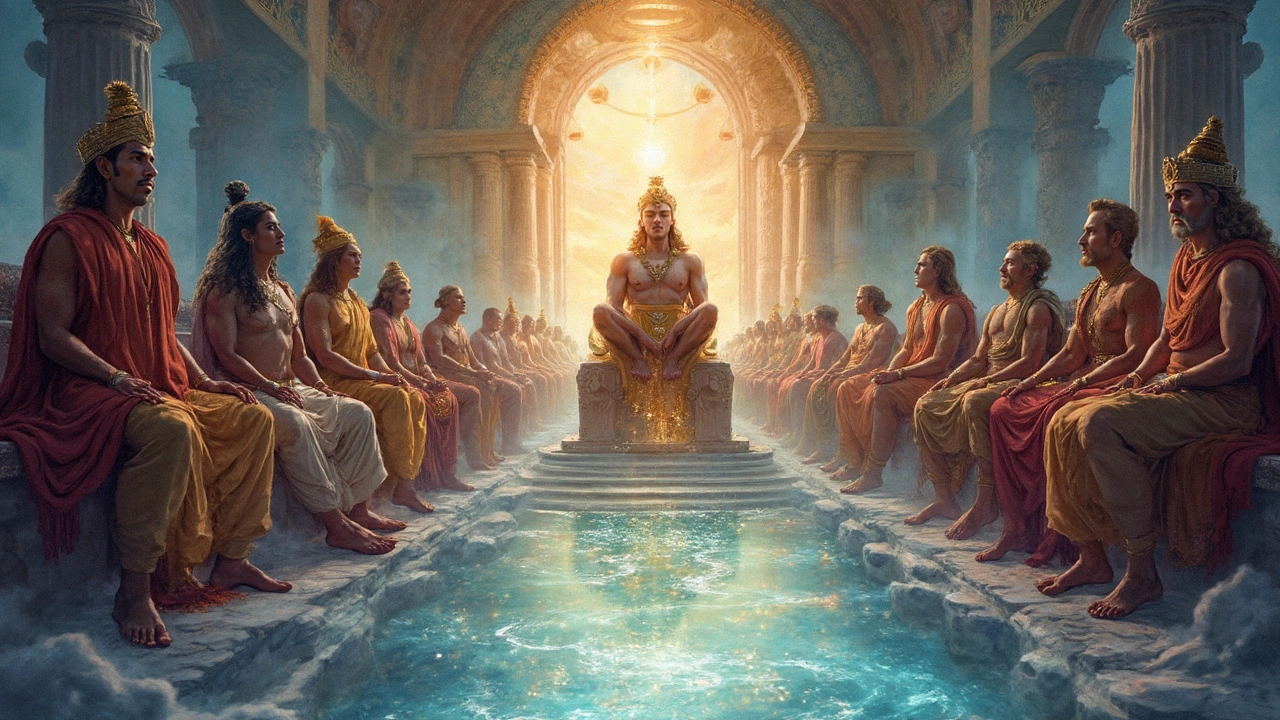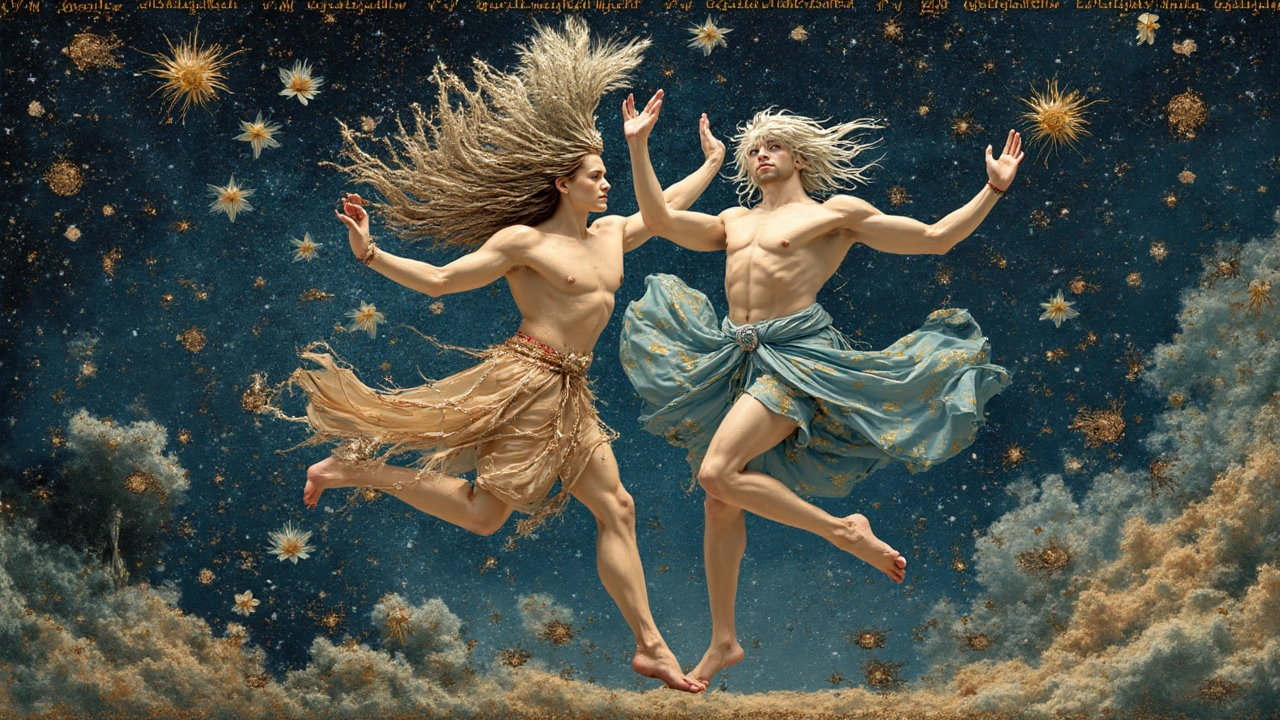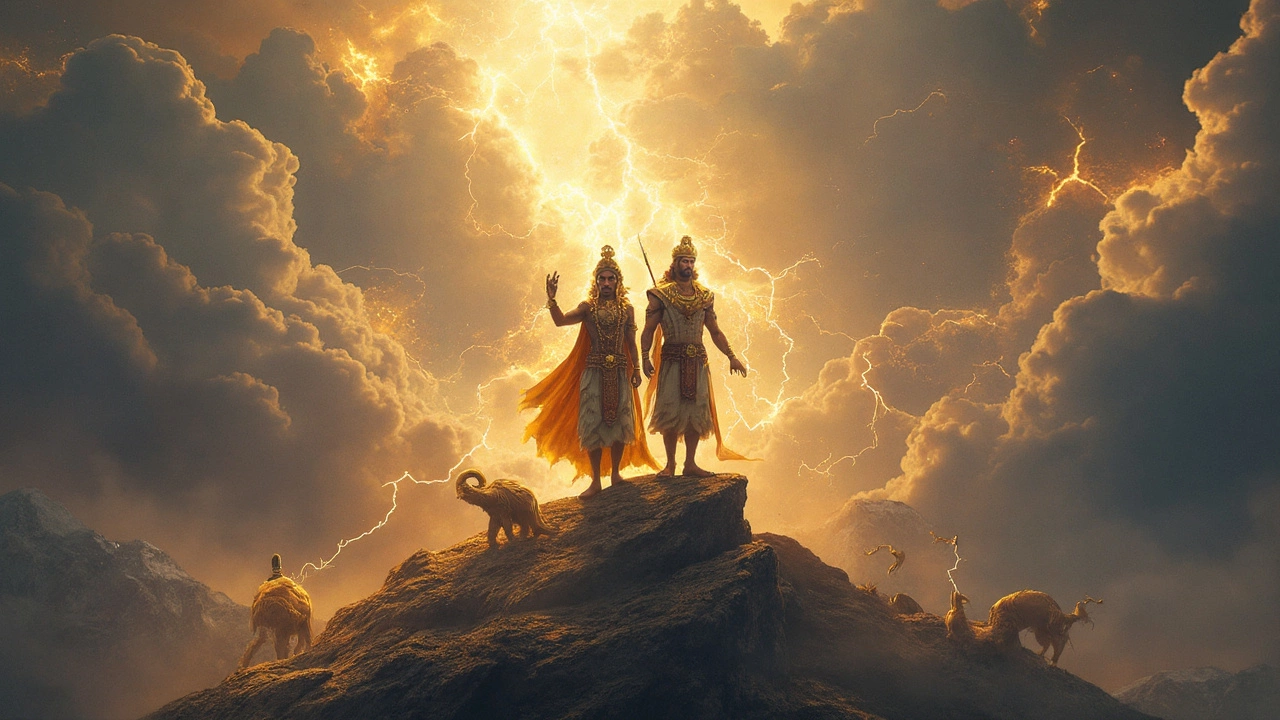Ever wondered if Zeus has a twin in Hindu mythology? Well, if you look closely, you'll find Indra, who seems like Zeus’ counterpart. Just like Zeus is the king of the Greek gods, Indra holds a similar position among the Hindu pantheon. He's the guy leading the charge with thunderbolts, managing the heavens, and ensuring order among deities.
But that's just the start. These two share fascinating power dynamics and stories that blur cultural lines between East and West. Dive deeper into their roles, powers, and how they fit into broader mythological tales. It’s amazing how people from different parts of the world have similar ideas about what's happening up above!
- Connecting Zeus and Indra
- Roles and Responsibilities
- Symbols and Powers
- Stories and Myths
- Cultural Significance
Connecting Zeus and Indra
So, what's the deal with Zeus and Indra? They've got more in common than you'd think. Both are top dogs in their respective pantheons. Zeus reigns supreme over the antiquated Greek mountaintops, while Indra takes charge in the Hindu heavens. But their similarities don't stop with their thrones and titles. Let's dig into what makes these two tick.
Ruler of the Skies
First up, both Zeus and Indra are all about the sky. They're the ultimate weather gods, controlling thunderstorms like they're personal DJ sets. Need rain? They've got you. Is it lightning time? They're on it. They use their power over the elements to maintain order and, occasionally, to flex just a bit.
The Thunderbolt Connection
In the arsenal of a deity, the thunderbolt is the weapon of choice for both gods. Zeus is famous for wielding his thunderbolt, a fearsome weapon that highlights his power. Likewise, Indra carries Vajra, a lightning bolt that he often uses to slay demons and send a clear message about who's boss.
Stories that Echo
Here's where it gets super interesting: They both have epic tales of heroism and conflict. Zeus has the whole Titanomachy saga, where he battled the Titans to claim his throne. On the flip side, Indra is celebrated for his epic battles against demons, famously defeating the demon king Vritra to release water for the world.
Overview of Responsibility
| Feature | Zeus | Indra |
|---|---|---|
| Role | King of Greek gods | King of Hindu gods |
| Main Weapon | Thunderbolt | Vajra (Thunderbolt) |
| Main Realm | Sky | Sky and Rain |
The parallels are uncanny, right? These stories and characteristics show how different cultures often have fascinating overlaps in their mythologies. Whether it's Zeus ruling over Olympus or Indra commanding the heavens, both leave their mark as figures of authority and control.
Roles and Responsibilities
So, how do Zeus and Indra compare when it comes to their divine duties? Let’s dive right in! Zeus, the kingpin of the Greek gods, has his hands full. He’s the ruler of Mount Olympus, calling the shots for both gods and humans. Zeus wields the thunderbolt, unchallenged as the god of the sky and weather. Need a storm or a sunny day? Zeus is your guy.
On the flip side, Indra is the big cheese in Hindu mythology, especially in the Vedic texts. He’s not just the god of rains and thunderstorms but also the protector of mankind. Indra leads the Devas, fighting off evils and demons, much like Zeus battles his foes but with a spicy Indian twist.
Authority Over the Cosmos
While both Zeus and Indra are responsible for cosmic order, their stories convey slightly distinct cultural nuances. Zeus is often sitting high, passing judgments, maintaining order among the Greek gods, and occasionally, mingling with humans to shake things up. Indra, meanwhile, takes a more warrior-like stance, widely celebrated in myths where he battles demons to keep the cosmic balance intact.
- Zeus’s Role: Facilitates divine law, oversees mortal affairs, commands the pantheon.
- Indra’s Duty: Wields weather, protects against demons, leads battles for good.
Both these gods, despite being from different civilizations, serve as powerful figures ensuring law and order on Earth and beyond. Fascinating, isn’t it? Their roles showcase how the human mind conceptualizes authority and protection in the divine realm.

Symbols and Powers
When it comes to the power game in mythology, Zeus and Indra are practically the MVPs of their respective realms. But what makes them tick? Let's break it down.
Zeus's Symbols and Powers
Zeus is often depicted wielding a mighty thunderbolt, which is kind of like his calling card. This isn't just any old electricity—it's the ultimate symbol of his power and authority. Zeus uses it to maintain order, dish out justice, and let both gods and humans know who's boss.
Beyond thunderbolts, Zeus is associated with an eagle, an emblem of his dominion over the sky. He's also linked to oak trees, which are seen as a symbol of strength and endurance. Pretty fitting for the king of the Greek gods, right?
Indra's Symbols and Powers
Now, let's talk about Indra. Much like Zeus, Indra has the vajra, a thunderbolt that he wields to protect the heavens and bring rain. It's no coincidence that rain is essential to agriculture, reflecting Indra's role in nurturing life and supporting his followers.
But that's not all. Indra is often shown riding a white elephant named Airavata, symbolizing royal power and religious significance. And if you’re into trivia, both Indra and Zeus are linked through their ability to shape-shift! How cool is that?
| Aspect | Zeus | Indra |
|---|---|---|
| Primary Weapon | Thunderbolt | Vajra (Thunderbolt) |
| Animal | Eagle | Elephant (Airavata) |
| Natural Element | Sky and Storms | Rain and Storms |
When we compare their symbols and powers, it’s pretty fascinating to see these two gods mirror each other despite being from entirely different cultures. It’s like they’ve got this shared cosmic toolkit! Understanding this can totally change how we view the stories and significance of these powerful beings.
Stories and Myths
Throughout the rich tapestry of mythology, Zeus and Indra have captivated imaginations with their epic stories. Let's look at some captivating tales that highlight their roles and adventures.
Zeus's Adventures
In Greek mythology, Zeus is well-known for many daring exploits. One of the most famous stories is about the Titanomachy, the war against his father Cronus and the Titans. Zeus, with his siblings, overthrew them, which allowed him to establish himself as the king.
Another interesting tale is about Prometheus, who dared to steal fire for humans. As a punishment, Zeus bound Prometheus to a rock where an eagle would feast on his liver daily, demonstrating Zeus's justice and, sometimes, wrath.
Indra's Feats
In Hindu stories, Indra, like Zeus, wields a thunderbolt, called Vajra. One of the classic stories involves Indra battling the demon Vritra, who imprisoned the world's waters. Indra's victory over Vritra symbolized the triumph of good over evil and restored balance and life to the land.
Indra is portrayed as a leader with weaknesses as well. In some stories, he faces consequences for his arrogance or misdeeds, teaching lessons of humility, much like Zeus's narratives.
Comparative Glimpse
While both of these mighty gods command respect and power, their stories serve as reflections of their cultures. Zeus' tales often delve into the profound themes of fate and justice, showcasing complex human emotions. On the other hand, Indra's narratives frequently emphasize cosmic order and dharma, blending divine duties with moral teachings.
Shared Symbols
| Attribute | Zeus | Indra |
|---|---|---|
| Weapon | Thunderbolt | Vajra |
| Title | King of the Gods | King of Heaven |
| Main Role | Sky god, protector | Rain god, protector |
These shared symbols and tales not only provide insight into the individual characters of Zeus and Indra but reveal universal themes that intrigue us to this day. Through their stories, we get a peek at how ancient people viewed the world and imparted important values through generations.

Cultural Significance
When we talk about Zeus and Indra, we're looking at more than just their roles as thunder-wielding deities. They’ve got a huge impact on the cultures they belong to, reflecting societal values and beliefs.
Both Zeus and Indra are at the top of their godly hierarchies, embodying leadership and authority. In ancient Greece, Zeus symbolized justice, law, and moral conduct, traits that were revered in Greek society. Similarly, Indra is seen as a warrior and protector, reflecting the Aryan values of strength and courage that shaped much of early Indian culture.
Symbols of Power
Cultural contexts make these gods more than divine beings. In art and literature, Zeus's iconic lightning bolt and Indra's vajra (thunderbolt) symbolize not only physical power but also the universe's order and harmony. These aren't just cool weapons; they're keys to understanding how people historically viewed something as unpredictable as the weather and its associated powers.
Influence on Modern Practices
Belief systems influence festivals, rituals, and stories that get passed down generations. In Greece, Zeus was central to the Olympic Games, while in India, Indra plays a prominent role in festivals like Indra Jatra, celebrated in Nepal. These practices continue to keep such myths alive, reinforcing cultural identity.
Understanding the impact these gods have had isn't just about tracing stories or comparing powers. It's about getting a glimpse into how different cultures developed values and traditions that continue to define them. This explains why many of their stories still resonate with us today.
